Miami Addiction Treatment & Mental Health Resources Guide
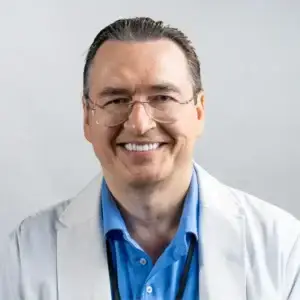
Dr. Rostislav Ignatov, MD
Chief Medical Officer
Miami continues to face significant behavioral health challenges driven by both opioids and stimulants. In 2023, the Miami-Dade Medical Examiner reported 338 deaths where fentanyl was present (277 directly caused by fentanyl) and 422 deaths where cocaine was present (293 directly caused by cocaine), underscoring the dangerous stimulant–opioid overlap. At the same time, fentanyl-analog deaths declined from 97 in 2022 to 81 in 2023, reflecting the impact of expanded naloxone distribution and countywide harm-reduction efforts.
According to the Florida Department of Health, Miami-Dade’s age-adjusted opioid overdose death rate was 25.3 per 100,000 residents in 2023, slightly below the statewide average of 31.7 per 100,000. Yet despite these modest improvements, treatment access remains uneven. Miami-Dade’s Community Action and Human Services Department (CAHSD) facilitated more than 3,200 treatment placements in 2023, but overall substance use treatment admissions have fallen 12% since 2021.
This guide is designed to help Miami residents navigate the county’s addiction, mental health, and recovery services, with resources spanning crisis response teams, Medicaid and safety-net programs, and peer-driven recovery networks across the city’s neighborhoods.
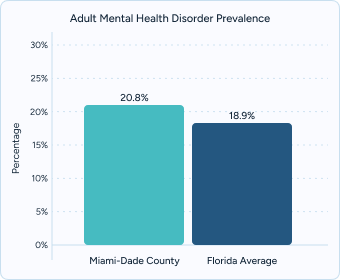
Adult mental health prevalence: About 20.8% of adults in Miami-Dade County report experiencing a mental health disorder in a given year, compared with the Florida average of 18.9%.
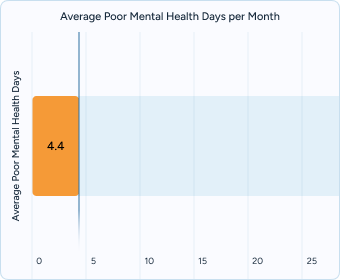
Poor mental health days: Residents report an average of 4.4 “poor mental health days” per month, reflecting ongoing stress and unmet needs.
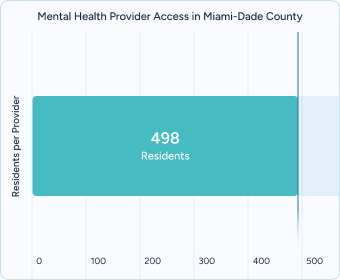
Provider access: Miami-Dade has roughly 498 residents for every one mental health provider, limiting access in high-need neighborhoods.
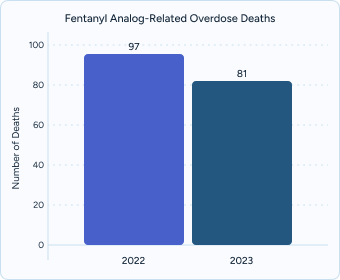
Substance use: Deaths involving fentanyl analogs fell from 97 in 2022 to 81 in 2023, a 16% decline, though fentanyl itself remains the leading driver of overdose deaths.
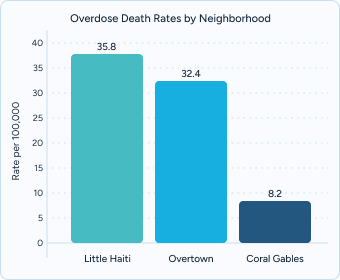
Neighborhood disparities: Little Haiti (35.8 per 100,000) and Overtown (32.4 per 100,000) report some of the highest overdose rates, while Coral Gables (8.2 per 100,000) remains among the lowest.
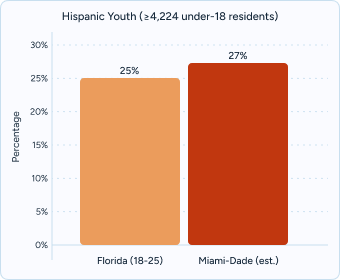
Rising prevalence in young adults: Nearly 1 in 4 young adults (ages 18–25) in Florida reported symptoms of anxiety or depression in 2023, according to CDC Household Pulse Survey data. Miami-Dade follows this pattern, with higher stress levels in communities with economic hardship and housing instability.
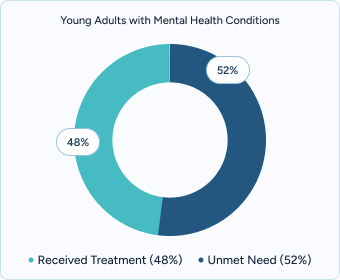
Unmet treatment needs: Despite improvements in provider availability, fewer than half of young adults with a diagnosed mental health condition in Florida received treatment last year. In Miami-Dade, access gaps are most pronounced among college students, LGBTQ+ residents, and immigrant populations.
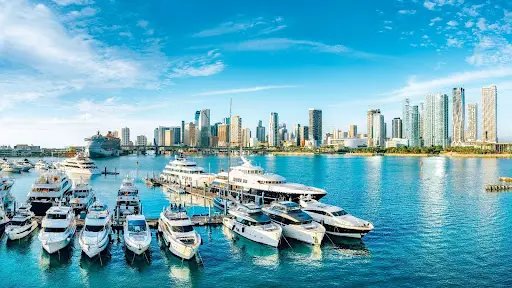
Miami addiction treatment centers address immediate needs across neighborhoods.
The Miami-Dade Crisis Response Unit serves as a centralized access point for treatment information and referrals. The program includes 24/7 mobile crisis intervention and psychiatric emergency services, distributing over 37,496 naloxone doses in 2024.
The Mobile Response Teams provide 24/7 crisis intervention, covering Liberty City, Overtown, Little Haiti, Homestead, and Kendall. With locations at New Horizons at 1469 NW 36th Street and Jackson Community Mental Health Center at 15055 NW 27th Avenue, it offers crisis stabilization, peer support counseling, and a 20-bed detoxification unit.
Transportation accessibility through Miami-Dade Transit links all neighborhoods to Miami drug rehab programs and mental health facilities. The Metrobus provides access to Jackson Behavioral Health Hospital, while Routes 11 and 27 connect downtown to areas like Liberty City and Overtown. The Special Transportation Service offers specialized transportation for individuals with disabilities.
Florida Medicaid covers a wide range of behavioral health and addiction services for eligible residents, including medical detox, residential treatment, outpatient therapy, psychiatric care, and medications such as buprenorphine and methadone. As of 2024, copayments for most services were eliminated, making treatment more accessible for low-income families and individuals up to 138% of the federal poverty level (depending on eligibility category).
Florida Medicaid Managed Care ensures ongoing support for children and adults, including crisis intervention and behavioral health benefits. Enrollment is available through the MyACCESS Florida portal or by calling 1-866-762-2237, with applications accessible in Spanish, Haitian Creole, and Portuguese.
Florida Healthy Kids provides affordable coverage for children in families who do not qualify for Medicaid. It currently serves households up to 200% of the federal poverty level, with expansion to 300% FPL federally approved in late 2024. Applications are available online or through Florida Department of Health regional offices.
Miami-Dade County’s AvMed Navigator Program, operated by the Community Action and Human Services Department (CAHSD), helps uninsured residents access wraparound funding, free insurance navigation, and placement into public treatment slots. Residents can call 311 or visit miamidade.gov to connect with local assistance.
Eliminating wait times with free insurance verification and a comprehensive clinical assessment upon inquiry, medical detox is available 24/7. Evidence-based therapies such as Eye Movement Desensitization and Reprocessing (EMDR), family therapy, and mindfulness-based relapse prevention ensure a safe and supportive start to recovery.
Insurance verification and coverage confirmation occur within 48 hours, with same-day admission available when clinically appropriate.
The Haven Detox – Florida, located near the Intracoastal Waterway, offers medical detox and stabilization under an interdisciplinary team using evidence-based approaches like cognitive behavioral therapy (CBT) and dialectical behavior therapy (DBT).
Treatment modalities include traditional therapies like motivational interviewing and holistic approaches such as yoga & guided meditation, acupuncture, and nature-based experiential exercises. With a 4:1 staff-to-client ratio, clients receive individualized support. Luxury amenities consist of private bedrooms, chef-prepared meals, a fitness studio, a pool deck, and beachfront walking trails.
This facility serves adults aged 18 and older experiencing substance dependency from Miami-Dade, Broward, and Palm Beach counties. Major commercial insurance plans are accepted, with transportation assistance available throughout South Florida. Continuous support is provided for individuals traveling from Miami or the surrounding communities.
Miami mental health services span multiple neighborhoods with specialized programming delivering depression treatment, anxiety care, crisis intervention, trauma recovery, substance use counseling, and dual-diagnosis support across Brickell, Little Havana, and North Miami. Programs feature culturally competent care, bilingual providers, trauma-informed approaches, community outreach initiatives, family-inclusive therapies, and holistic community-based programs to address the spectrum of emotional well-being citywide.
Neighborhood-specific mental health resources ensure accessibility across Miami’s diverse communities. In Wynwood, community clinic counseling and mobile therapy units support bilingual adolescents and young adults with integrated mental health and substance use treatment. In Coconut Grove, peer-led support circles and a faith-based counseling center for older adults offer culturally tailored grief support, caregiving resources, and medication-assisted recovery options to foster resilience and enable telehealth follow-ups.
Comprehensive peer-led recovery resources across metropolitan neighborhoods
Thriving Mind Peer Support Services in Downtown Miami (888-248-3111)
Provides free peer-led recovery support, certified peer specialist training, and bi-weekly supervisor meetings. Features 24/7 helpline support and monthly Southern Regional peer meetings for specialists.
New Horizons Community Mental Health Center in Liberty City (305-638-7444)
Offers culturally responsive peer support groups, Spanish-language recovery circles, and weekly sober social events. Specializes in trauma-informed peer coaching with weekend hours and active social media engagement.
FARR-certified recovery residences meeting national standards
Florida Association of Recovery Residences (FARR) maintains certification standards based on National Alliance for Recovery Residences (NARR) accreditation and a directory available at farronline.org.
Serenity Homes Miami features 24-hour staffing, secure keyless entry, community kitchen, and Wi‑Fi access. Requires weekly house meetings, a rotating chores schedule, and random drug screenings.
Recovery Living South Florida offers peer-led supervision, shared living spaces, laundry facilities, and parking availability. Participation includes nightly curfew, mandatory 12-step meeting attendance, and employment requirements.
Mutual aid support through established community partnerships
Miami-Dade Intergroup coordinates 180+ weekly AA meetings through aamiamidade.org with meeting finder app partnerships.
Spanish-Language Groups
Serves Miami’s Hispanic community through Grupo Central, Un Dia a la Vez, and El Milagro meetings. Multiple downtown locations with daily evening sessions and dedicated helpline listed at 305-842-2085.
LGBTQ+ Affirmative Meetings
Offers Miami-Dade’s most inclusive recovery meetings. LGL Virtual Group provides online support, and All Together Group offers transgender-affirming spaces. Features specialized topic support and Pride event partnerships.
Finding the right treatment center in Miami means more than just locating the closest facility. It’s about making sure the program offers care that matches the city’s unique needs and cultural diversity. When comparing options, here are the features Miami residents should prioritize:
Many people in Miami face both mental health challenges (anxiety, PTSD, depression) and substance use issues. A quality program will screen for both and create an integrated treatment plan from the start.
Co-occurring disorder treatment is especially important in areas where stimulant–opioid overlap is common, such as Overtown and Little Haiti.
Miami’s diversity means effective programs offer services in Spanish, Haitian Creole, and Portuguese, along with LGBTQ+-affirming care.
Faith-based recovery options, family-inclusive therapy, and community-specific support groups ensure treatment feels personal and respectful.
By focusing on these features, Miami residents can identify treatment programs that provide not only safe detox and behavioral health support but also a strong foundation for long-term recovery.
In Miami, effective recovery programs begin planning for aftercare while clients are still in detox or residential treatment. Step-down options such as intensive outpatient programs (IOPs), outpatient counseling, and peer recovery coaching are available across neighborhoods including Little Havana, Liberty City, and Homestead. Programs that use warm handoffs—directly connecting clients to these community-based services—help reduce gaps in care and improve long-term treatment success.
Family and community involvement also play an essential role in sustained recovery, particularly in Miami where multigenerational households are common. Many providers offer bilingual family therapy sessions in Spanish and Haitian Creole, along with Al-Anon support groups and culturally tailored workshops that teach families how to support recovery while maintaining healthy boundaries. For clients unable to safely involve family, peer-led networks and alumni support groups provide alternative pathways for accountability and encouragement.
Relapse prevention in Miami is strengthened through access to local and statewide resources designed to respond quickly to crises. Community programs such as Thriving Mind South Florida and The Living Room at New Horizons provide relapse stabilization and 23-hour crisis respite services without requiring emergency room admission. Certified peer specialists and alumni programs extend ongoing support through weekly check-ins, recovery circles, and sober social events. Meanwhile, statewide initiatives such as Florida’s Mobile Response Teams (MRTs) and the 988 Florida Lifeline ensure rapid re-entry into treatment when relapse or mental health decline occurs, closing gaps and keeping residents connected to care.
Miami’s behavioral health system emphasizes both immediate stabilization and long-term recovery, combining clinical excellence with community-based supports. Key elements include:
Trauma-Informed Care
Incorporates therapies such as Eye Movement Desensitization and Reprocessing (EMDR). Staff receive trauma-specific training and ongoing supervision. Designed to address underlying trauma that often fuels addiction.
Alumni and Aftercare Networks
Quarterly alumni reunions and peer-support events across Miami-Dade. Online support forums and recovery circles to maintain accountability. Continued mentorship and coaching to prevent relapse after discharge.
Support Services
Benefits navigation and payment options for uninsured or underinsured residents. Dedicated financial advocates and clinical referral coordinators streamline access to resources. Coordination with community programs for ongoing care.
Professional treatment represents an investment in recovery success, offering immediate access, personalized care, and comprehensive services designed to address the complex nature of addiction and mental health conditions.
Insurance and Benefits Verification explains coverage options within 24 hours, provides detailed cost estimation assistance, emphasizing transparency and eliminating financial surprises during treatment.
Assessment and Intake Process offers same-day clinical evaluations and next-day residential placement, featuring streamlined admission procedures that minimize delays and support treatment readiness.
Most programs schedule an initial assessment within 48 hours, then connect you with a therapist based on your needs and insurance coverage.
Medicaid and state plans typically cover individual and group therapy with eliminated copays; check your managed care plan for provider networks.
Yes. Many community centers offer bilingual Spanish, Haitian Creole, and Portuguese peer-support meetings with native-language facilitators and interpreters.
Several nonprofit clinics provide sliding-scale fees and grant-funded treatment; inquire about Miami-Dade County financial assistance when contacting intake offices.
Some programs partner with Miami-Dade Transit to offer reduced-fare transportation passes and specialized medical transport vouchers for clients.
Crisis hotlines and mobile response teams operate 24/7—call 988 Florida Lifeline or The Village South Mobile Response 1-800-435-7968 for immediate mental health support.
Yes. Certified family peer specialists offer confidential coaching through Al-Anon Miami, family therapy programs, and intervention services coordination.
Look for centers offering LGBTQ-affirming groups at Lambda Miami-Dade, Hispanic recovery services, and Haitian Creole-speaking support circles.
Yes. Many organizations run college outreach programs, young adult recovery groups, and age-specific counseling services designed for adults aged 18-25.
Florida Department of Law Enforcement (FDLE), Medical Examiners Commission. Drugs Identified in Deceased Persons: 2023 Annual Report. Tallahassee, FL: FDLE; 2024. https://www.fdle.state.fl.us/MEC/Publications-and-Forms/Documents/Drugs-in-Deceased-Persons/2023-MEC-Drugs-in-Deceased-Persons-Annual-Report_Final.pdf
Florida Department of Law Enforcement (FDLE), Medical Examiners Commission. Drugs Identified in Deceased Persons: 2022 Annual Report. Tallahassee, FL: FDLE; 2023. https://www.floridahealth.gov/statistics-and-data/e-forcse/news-reports/2022-Florida_Medical_Examiners_Annual-Drug-Report-FINAL.pdf
Florida Department of Health. FLHealthCHARTS: Substance Use Dashboard – Overdoses. Accessed September 2025. https://www.flhealthcharts.gov/ChartsDashboards/rdPage.aspx?rdReport=SubstanceUse.Overdose
Centers for Disease Control and Prevention (CDC). SUDORS Dashboard: Fatal Drug Overdose Data. Accessed September 2025. https://www.cdc.gov/overdose-prevention/data-research/facts-stats/sudors-dashboard-fatal-overdose-data.html
Florida Department of Health. Florida Drug Overdose Surveillance and Epidemiology (FL-DOSE). Accessed September 2025. https://www.floridahealth.gov/programs-and-services/opioid-response/fl-dose/index.html
Miami-Dade County, Community Action and Human Services Department (CAHSD). Annual Report 2023. Miami, FL: CAHSD; 2024. https://www.miamidade.gov/socialservices/library/reports/2023-annual-report.pdf
Agency for Health Care Administration (AHCA). Community Behavioral Health Services – Coverage Policy. Tallahassee, FL: AHCA; 2024. https://ahca.myflorida.com/medicaid/medicaid-policy-quality-and-operations/medicaid-policy-and-quality/medicaid-policy/medical-and-behavioral-health-coverage-policy/behavioral-health-and-health-facilities/community-behavioral-health-services
Agency for Health Care Administration (AHCA). Community Behavioral Health Services Fee Schedule. January 2024. https://ahca.myflorida.com/content/download/24298/file/2024%20Community%20Behavior%20Health%20Fee%20Schedule.pdf
Kaiser Family Foundation (KFF). Medicaid Income Eligibility Limits for Adults as a Percent of the Federal Poverty Level (Florida). Accessed September 2025. https://www.kff.org/affordable-care-act/state-indicator/medicaid-income-eligibility-limits-for-adults-as-a-percent-of-the-federal-poverty-level/
Florida Senate, Committee on Health Policy. SB 246 (2023) Analysis: KidCare Income Eligibility Expansion. Tallahassee, FL: Florida Senate; 2023. https://www.flsenate.gov/Session/Bill/2023/246/Analyses/2023s00246.pre.ahs.PDF
Florida Health Justice Project. KidCare Expansion Status – Federal Approval to 300% FPL. December 2024. https://floridahealthjustice.org/publications/kidcare-expansion-status-december-2024-federal-government-approves-expansion-in-florida/
988 Suicide & Crisis Lifeline. About 988 and local routing to Florida Lifeline centers. Accessed September 2025. https://988lifeline.org
Let’s talk about what’s going on — no judgment. (We’ve been there before ourselves). No one will know you inquired and there is no commitment to call.
24/7 Support
No Commitment
100% Private
There’s no catch. Checking your insurance is simply a way to see what your plan covers — it doesn’t lock you into treatment, notify anyone, or cost you anything. You get answers upfront to decide what makes sense for you.
Protecting your privacy matters! No information or notifications are ever sent to your employer or family — whether you check your insurance online or call. Everything is handled through secure, encrypted systems that meet strict medical privacy laws. You stay in control of your information!
Luckily, most insurance policies cover treatment here. Depending on the healthcare you’ve already had this year, costs could even be zero. Instead of worrying, let’s just find out what your plan covers.
Most likely. We work with major providers like Cigna, Aetna, and United Healthcare, public insurances like Tricare and tribal plans, and even smaller plans like Surest Bind and Harvard Pilgrim. The quickest way to know for sure is to check online or call. It’s a quick, private way to understand what is covered upfront.
Verifying your insurance isn’t a commitment to start treatment — it’s simply a way to see what your options are. Knowing your coverage ahead of time helps you make more informed, confident decisions. It also helps flag a spot, so you’re able to get right in if you ever do decide you’re ready.
You need your policy number to check your specific policy online. If you want general information, just call. You likely have questions beyond insurance anyway. Reaching out now helps you figure out the right fit if or when you’re ready. You don’t have to put off the call until you’re in crisis. Calling is not scary, I promise!